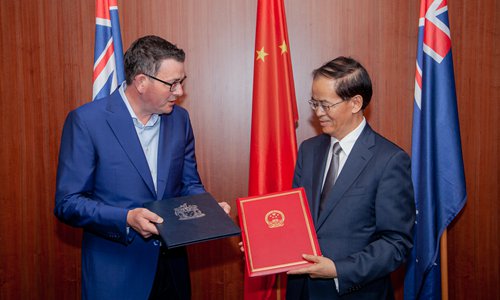
Chinese Ambassador to Australia Cheng Jingye (right) and Premier of Victoria Daniel Andrews attend a ceremony to mark the Australian state of Victoria's signing of a memorandum of understanding with China's economic planning authority on the Belt and Road initiative. Photo: Website of China's Embassy in Australia
Victoria became the first Australian state to sign a memorandum of understanding (MoU) with China's economic planning authority on the Belt and Road initiative following a signing ceremony in Victoria's capital city Melbourne, the Chinese Embassy in Australia said Friday.
Chinese experts said on Sunday that China is moving in the right direction by dealing with not only central governments of other countries when it comes to cooperation under the Belt and Road initiative (BRI).
The MoU was signed between Victoria's state government and China's National Development and Reform Commission and a ceremony was held on Thursday attended by Chinese Ambassador to Australia Cheng Jingye and the Premier of Victoria Daniel Andrews, said a statement from the website of the Chinese embassy.
Business dealings with China already pump around $19.1 billion a year into Victoria's economy in merchandise trade alone, and Andrews believes the agreement will help cement Victoria as China's trade and investment gateway to Australia, the Xinhua News Agency reported on Friday.
"In four years we have more than tripled Victoria's share of Chinese investment in Australia and nearly doubled our exports to China," Andrews said.
Victoria signed a sister state agreement with East China's Jiangsu Province in 1979. Jiangsu, with a GDP of 4.48 trillion yuan ($640 million) in the first half of 2018, is the second largest contributor to China's overall GDP. The Australian state also signed a sister state agreement with Southwest China's Sichuan Province in 2016.
Wang Yiwei, director of the Renmin University of China's Institute of International Affairs, told the Global Times on Sunday that Victoria is a state that is more focused on business than politics compared to Australia's capital Canberra.
While Canberra deals more with issues related to national security and ideology, local governments tend to be more practical in their cooperation, Wang said.
Han Feng, a research fellow at the National Institute of International Strategy under the Chinese Academy of Social Sciences, told the Global Times on Sunday that he expects more Australian states to make similar moves, as China-Australia ties have begun to recover from recent lows.
The Australian Financial Review reported on Friday that the government of Victoria bypassed the Australian federal government in signing the agreement, noting the federal government has not yet signed up to the initiative.
It is "naive" to ignore the potential opportunities from the Belt and Road initiative, the report quoted senior Australian businessman Malcolm Broomhead as saying.
When meeting with Chinese State Councilor and Foreign Minister Wang Yi on September 24, Australian Minister for Foreign Affairs Marise Payne said her country values the Belt and Road initiative, and is willing to enhance collaboration with China on bilateral, regional and global agendas through dialogues, Xinhua reported.
US strategy off track
Australia is not the only country that recently expressed greater interest in the China-proposed Belt and Road initiative.
Japanese Prime Minister Shinzo Abe said on Friday during his official visit to China that the initiative is a promising concept. Japan is willing to strengthen cooperation with China in a wide range of fields, including jointly exploring third-party markets, Xinhua reported.
Australia and Japan, which the US drafted into its "Indo-Pacific strategy," have realized that the US strategy not only damages the interests of China, but also harms their own, Li Haidong, a professor at the China Foreign Affairs University in Beijing, told the Global Times on Sunday.
The positive moves from Australia and Japan toward the BRI are signs that that US efforts to isolate China are failing, said Li.

